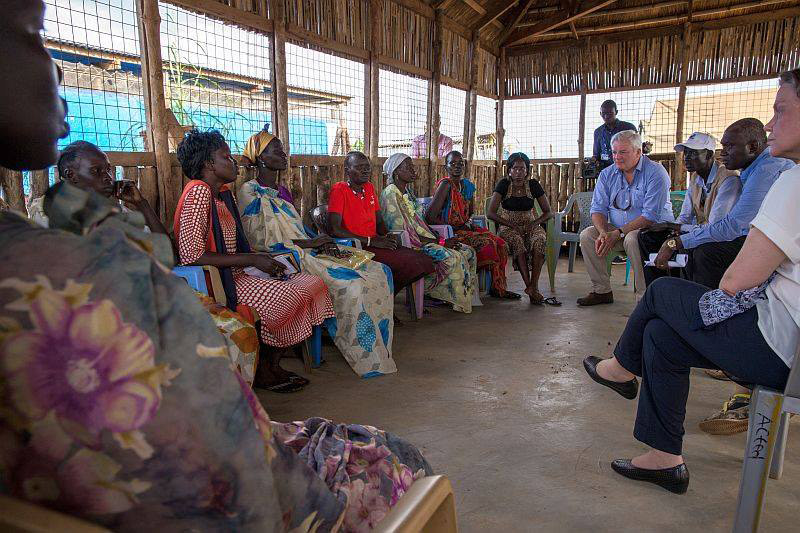'Senseless cycle of violence' in South Sudan must end – UN humanitarian chief
Amid massive displacement and “horrendous atrocities,” civilians continue to bear the brunt of South Sudan's brutal conflict, the top United Nations relief official underscored today, as he urged all parties, including the leaders of the warring factions, to “listen to their people,” lay down their arms and halt the rapidly spiralling humanitarian crisis.

UN Emergency Relief Coordinator Stephen O'Brien (top, centre), on a visit to South Sudan, meets with women representatives in the Protection of Civilians site 3, in the capital Juba.
“I am deeply shocked by what I have seen. Innocent civilians are bearing the brunt of this brutal war,” said Stephen O'Brien, the UN Under-Secretary-General for Humanitarian Affairs, as he wrapped up a four-day visit to South Sudan, which earlier this month, marked the fourth anniversary of its independence amid ongoing violence and deprivation.
Mr. O'Brien, who is also the UN Emergency Relief Coordinator, painted a grim picture of the situation in South Sudan, which has been wracked by instability and conflict since later December 2013.
“Families have endured horrendous atrocities – including killing, abduction, and the recruitment of children into armed groups. Women and girls have been beaten, raped and set on fire,” he said, explaining that entire communities have lost their homes and their livelihoods. Many people are starving, living in swamps or in bushes, hiding in fear of their lives.
“This senseless cycle of violence must stop,” he declared.
During his mission, Mr. O'Brien met with humanitarian partners, Government officials and the diplomatic community, and visited communities affected by the conflict in Juba, the capital, and Unity state.
The UN humanitarian chief called on the leaders of the warring factions to take responsibility for their own actions and for those who act in their name; “I call on the leadership of South Sudan to listen to their people and lay down their arms, to stop the violence, reconcile their differences and commit to peace.”
According to the UN Office for the Coordination Of Humanitarian Affairs (OCHA), which Mr. O'Brien heads, the humanitarian consequences of the nearly 20-month long conflict in South Sudan are grave: Some 4.6 million people are severely food insecure, with a quarter of a million children at risk from rapidly worsening nutrition.
Massive displacement continues – over two million people, half of whom are children –have fled their homes. This includes some 1.6 million people displaced inside South Sudan and almost 600,000 who have fled to neighbouring countries.
“Humanitarian needs are higher now than ever and we cannot wait to respond, to do even more than brave humanitarians are already delivering. I appeal to the international community to act now to avert an even greater humanitarian tragedy in South Sudan,” underscored Mr. O'Brien.
The South Sudan Humanitarian Response Plan for 2015 is currently only 42 per cent funded, leaving a gap of nearly $1 billion dollars, according to OCHA.
The security situation in South Sudan has deteriorated steadily over the past year since political in-fighting between President Kiir and his former Vice-President, Riek Machar, and their respective factions erupted in December 2013. The hostilities subsequently turned into a full-fledged conflict, resulting in reported atrocities and possible war crimes.
The UN Security Council marked the fourth anniversary of South Sudan's independence by expressing profound disappointment in South Sudan's leaders for putting their personal ambitions ahead of the good of their country and their people, sparking months of politically motivated violence that has left thousands dead and caused a “man-made…catastrophe.”
source: United Nations
- 404 reads
Human Rights
Ringing FOWPAL’s Peace Bell for the World:Nobel Peace Prize Laureates’ Visions and Actions

Protecting the World’s Cultural Diversity for a Sustainable Future

The Peace Bell Resonates at the 27th Eurasian Economic Summit

Declaration of World Day of the Power of Hope Endorsed by People in 158 Nations

Puppet Show I International Friendship Day 2020

